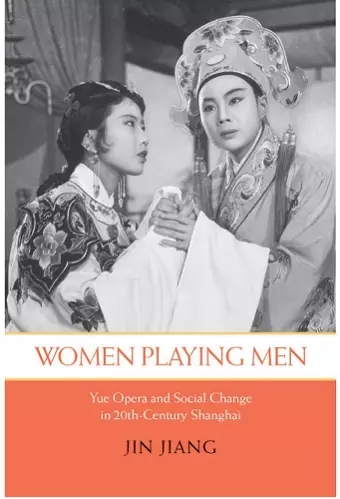Women Playing Men
Yue Opera and Social Change in Twentieth-Century Shanghai
Format:Hardback
Publisher:University of Washington Press
Published:14th Apr '09
Currently unavailable, and unfortunately no date known when it will be back
This hardback is available in another edition too:
- Paperback£27.99(9780295988443)

Women Playing Men shows how an obscure rural genre became one of the most popular forms of local drama in the nation and how largely illiterate peasant women established themselves in the city and helped shape modern cosmopolitanism. It has broad implications of central concern to the fields of Chinese popular culture, women's history, and urban history. -- Hanchao Lu, author of Beyond the Neon Lights The book leads us to a new understanding of urban popular culture and state-building through the twentieth century... well-researched and clearly represented work ... -- Di Wang, Frontiers of History in China
Explores the influence of Yue opera - a subgenre of Chinese opera that transformed all-male opera into an all-female art form, with women cross-dressing as male characters. This volume details the contributions of opera stars and related professionals and examines the relationships among actresses, patrons, and fans.
This ground-breaking volume documents women's influence on popular culture in twentieth-century China by examining Yue opera. A subgenre of Chinese opera, it migrated from the countryside to urban Shanghai and morphed from its traditional all-male form into an all-female one, with women cross-dressing as male characters for a largely female audience.
Yue opera originated in the Zhejiang countryside as a form of story-singing, which rural immigrants brought with them to the metropolis of Shanghai. There, in the 1930s, its content and style transformed from rural to urban, and its cast changed gender. By evolving in response to sociopolitical and commercial conditions and actress-initiated reforms, Yue opera emerged as Shanghai's most popular opera from the 1930s through the 1980s and illustrates the historical rise of women in Chinese public culture.
Jiang examines the origins of the genre in the context of the local operas that preceded it and situates its development amid the political, cultural, and social movements that swept both Shanghai and China in the twentieth century. She details the contributions of opera stars and related professionals and examines the relationships among actresses, patrons, and fans. As Yue opera actresses initiated reforms to purge their theater of bawdy eroticism in favor of the modern love drama, they elevated their social image, captured the public imagination, and sought independence from the patriarchal opera system by establishing their own companies. Throughout the story of Yue opera, Jiang looks at Chinese women's struggle to control their lives, careers, and public images and to claim ownership of their history and artistic representations.
"Jin Jiang's groundbreaking book is by far the best study of women's Yue opera as a social and cultural history in any language. . . . fascinating and surprisingly accessible. . ."
-- Liang Luo * China Review International *"This clearly written text will be useful to those interested in Chinese theatre, women and performance, and the history of modern China. . . . This book, rich in social and theatre history, puts this understudied genre center stage."
-- Kathy Foley * Theatre History Studies *"A major contribution to Chinese theater, performance studies, and modern history. . . . It breaks new ground in existing scholarship on traditional Chinese opera . . . [and] draws needed attention to the intriguing question of women's culture and gender identity in cosmopolitan Shanghai during the Republican period."
-- Xiaomei Chen * The Opera Quarterly *"Scholars and teachers who work in the fields of China's gender, cultural, and urban histories will commend its publication."
-- Yuen Ting Lee * Canadian Journal of History, vol. XLVI *"The stories, people, plays, and films that are the legacy of Yue opera and which Jin Jiang so lovingly preserves in her book are a vital reminder of how deeply engrained our needs are for entertainment focusing on that universal theme: love."
-- Andrew Field * American Historical Review *"Jin Jiang's study on the history of Yue opera is as thoughtful in its elucidation of social and political contexts as it is sympathetic in its intimate portraits of its protagonists, the actresses who created Yue opera…. the work provides an important addition to our understanding of the transformations of gender ideology and gendered praxis and performance in twentieth-century China. What is more, her history fully bridges-indeed, incorporates—the challenge that 1949 typically represents for historians of modern Chinese culture."
* The Journal of Asian Studies *"The transformation of a rural, male dramatic form into an urban, female phenomenon lies at the heart of this stimulating study of 20th-century Shanghai culture. . . . Recommended."
* Choice *"…women of Yue opera expressed modern urban feminine aspirations through the aesthetics and narratives of Yue opera. Such expressions represented the rise of feminine power in Shanghai and in Chinese society in general. This book should be welcomed by scholars in Chinese gender studies."
* China Qaurterly *"This well-researched study examines a form of dialect opera that burst onto the scene in Shanghai in the 1920s, transformed itself under the aegis of its female stars in the 1930s and 1940s, eclipsed Bejing opera in the 1940s and maintained its predominance well into the 1980s. . . . This excellent study will be of interest to scholars and students of Chinese drama, urban popular culture, women's history, and gender studies.
* Pacific Affairs *"Drawing on a wealth of written and oral sources the author effectively engages the subject from a cultural studies/feminist theory perspective to provide an outstanding example of how social and cultural dynamics can be examined through the lens of a performance tradition."
* The Chinese Historical ReviISBN: 9780295988436
Dimensions: unknown
Weight: 658g
352 pages